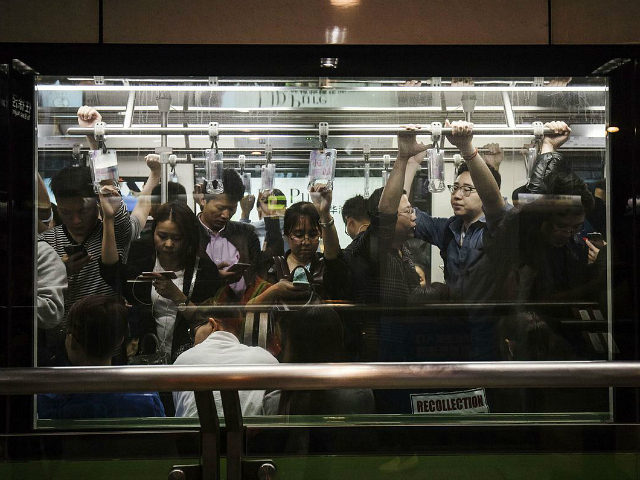Stung by criticism of China’s disturbing new “social credit system,” the state-run Global Times responded on Wednesday that such a system is necessary to fight corruption among its huge population.
China’s social credit system hands out points to citizens for everything from traditional credit scores to surveillance data collected by millions of cameras, Internet tracking, and bonuses for performing “heroic acts.”
The Global Times expressed annoyance with everything from detailed analyses warning about the erosion of China’s “already scant freedoms” to late-night comedians – namely Stephen Colbert – mocking a system that monitors citizens every moment of their lives and then decides if they should be allowed to ride on trains.
The response to these criticisms is bizarre on several counts, and certainly not very flattering to the Chinese people:
In today’s Chinese society, trustworthiness is not highly honored. That’s why we see corruption, expired vaccines, commercial fraud, tax dodging and academic cheating from time to time. Take the arson case in Hangzhou last year. A nanny started a fire that killed a mother and her three children: She was in huge debt and starving for more money from her wealthy employer. It was a tragedy caused by the lack of a credit ranking system.
The nanny in Hangzhou, 35-year-old Mo Huanjing, was carrying over $9,500 in gambling debt. She started the fire in an effort to scam the family out of reward money for rescuing them from the catastrophe she created. The “rescue” phase of the grift went horribly wrong because the fire hydrant outside the building was defective and firefighters had trouble accessing the premises when they arrived.
Before that, she allegedly stole and pawned around $30,000 of the family’s jewelry and irresponsibly spent the money they willingly paid her. Her browser history included searches for such topics as, “Will arson lead to prison?”
The court called her “despicable,” the husband and father of her victims called her a “devil,” and she was sentenced to death in February.
Not only does China’s leadership view its people as corrupt, but the Global Times calls them out as lousy drivers too:
There are not many traffic violators in the U.S. and the primary reason is that the cost of violating traffic laws is very high. It is recorded on one’s credit record, affecting employment, loans, rent, perhaps even marriage. However, such a system in China is not well-established, which means breach of promise or fraud will not result in heavy penalties or other serious consequences.
The assertion that there are “not many traffic violators in the U.S.” will come as surprising news to the American law-enforcement community. Setting up a better system for keeping track of traffic tickets in China would have been far less objectionable than planting cameras everywhere and compiling huge electronic dossiers on every action taken by every citizen:
Against this backdrop, China hopes to set up a comprehensive social credit ranking system, allowing the trustworthy to enjoy more benefits while making it hard for the discredited to do anything. The move can link creditworthiness to people’s future interests and risks, rewards and punishments. It’s a response to China’s credit crisis, an innovative measure to govern society. And the rapid development of internet technologies has provided the nation with more technical support and opportunities to do this.
China’s “credit crisis” is not primarily a matter of rascally citizens running up mountains of credit-card debt and thus proving their lives need to be micromanaged. A great deal of the debt problem was caused by state-run enterprises and semi-private entrepreneurs “using credit relatively inefficiently,” as an International Monetary Fund analysis put it. In other words, they borrowed big money for projects that failed to generate the expected level of return.
The Global Times wraps up by playing the “China is different” card to chide those who judge China’s authoritarian government by Western standards of liberty:
Governance has never been easy in China, the most populous country on Earth. So the nation has to explore the path that suits it the most. Judging China by Western standards is therefore biased. When it comes to the social credit system, countries everywhere are exploring. Why can’t China use modern techniques to try out this system? Doesn’t the US track traffic violators with surveillance cameras?
The last lines of the editorial are the scary part because it is true that “countries everywhere are exploring” ideas like this. Communist China will make a persistent ideological argument that it is merely being more thorough, taking better advantage of technology, and carrying the concept of judging citizen quality to its logical extreme.

COMMENTS
Please let us know if you're having issues with commenting.